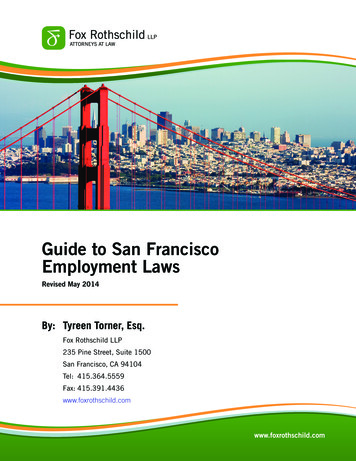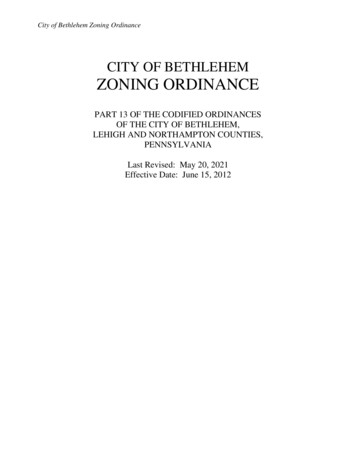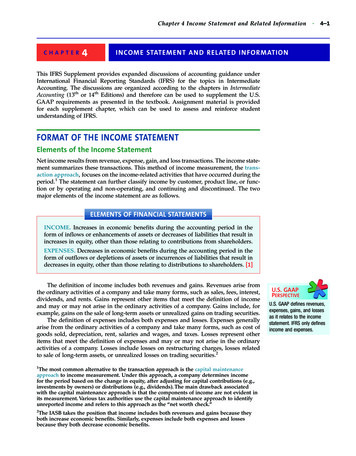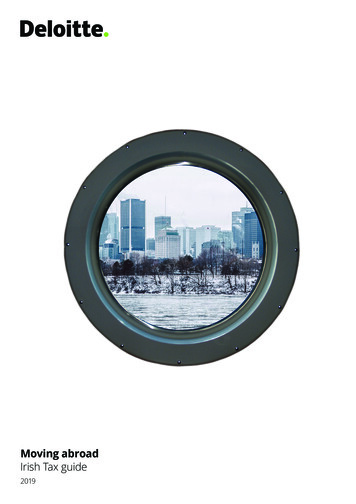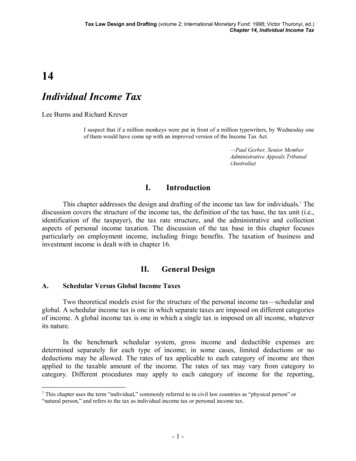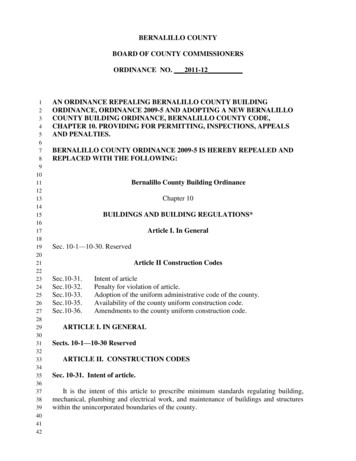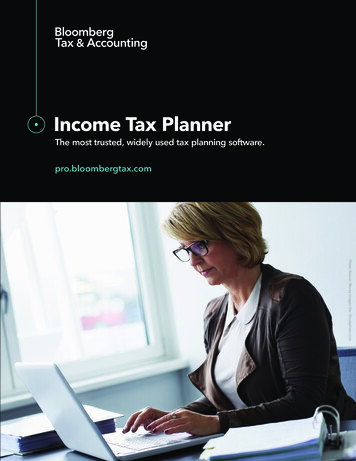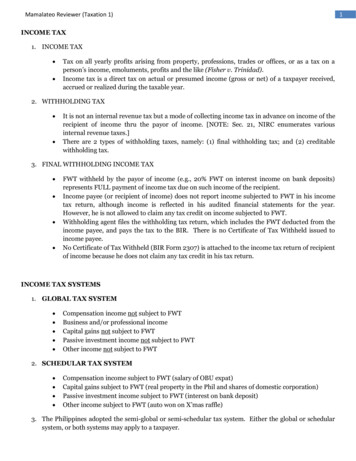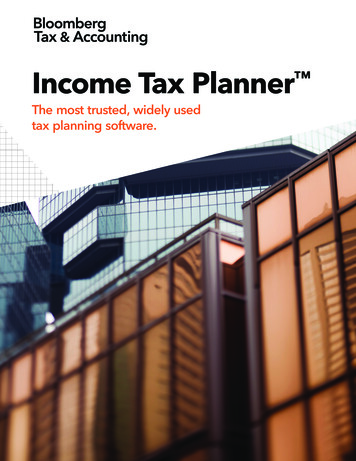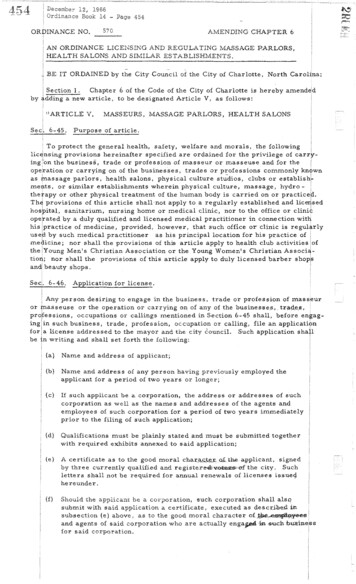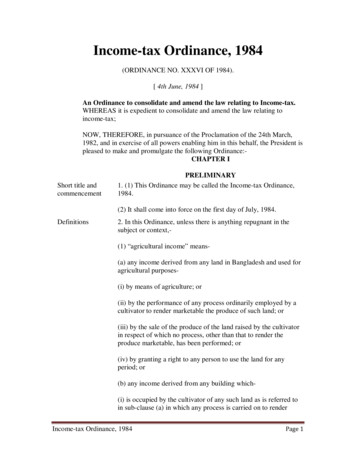
Transcription
Income-tax Ordinance, 1984(ORDINANCE NO. XXXVI OF 1984).[ 4th June, 1984 ]An Ordinance to consolidate and amend the law relating to Income-tax.WHEREAS it is expedient to consolidate and amend the law relating toincome-tax;NOW, THEREFORE, in pursuance of the Proclamation of the 24th March,1982, and in exercise of all powers enabling him in this behalf, the President ispleased to make and promulgate the following Ordinance:CHAPTER IShort title andcommencementPRELIMINARY1. (1) This Ordinance may be called the Income-tax Ordinance,1984.(2) It shall come into force on the first day of July, 1984.Definitions2. In this Ordinance, unless there is anything repugnant in thesubject or context,(1) “agricultural income” means(a) any income derived from any land in Bangladesh and used foragricultural purposes(i) by means of agriculture; or(ii) by the performance of any process ordinarily employed by acultivator to render marketable the produce of such land; or(iii) by the sale of the produce of the land raised by the cultivatorin respect of which no process, other than that to render theproduce marketable, has been performed; or(iv) by granting a right to any person to use the land for anyperiod; or(b) any income derived from any building which(i) is occupied by the cultivator of any such land as is referred toin sub-clause (a) in which any process is carried on to renderIncome-tax Ordinance, 1984Page 1
marketable any such produce as aforesaid;(ii) is on, or in the immediate vicinity of, such land; and(iii) is required by the cultivator as the dwelling house or storehouse or other out-house by reason of his connection with suchland;(2) “amalgamation”, in relation to companies, means the mergerof one or more companies with another company, or the merger oftwo or more companies to form one company (the company orcompanies which so merged being referred to as theamalgamating company or companies and the company withwhich they merge or which is formed as a result of the merger asthe amalgamated company) in such a manner that by virtue of,and for reasons attributable to, the merger,(a) all the property of the amalgamating company or companiesimmediately before the merger becomes the property of theamalgamated company;(b) all the liabilities of the amalgamating company or companiesimmediately before the merger become the liabilities of theamalgamated company; and(c) the shareholders holding not less than nine-tenths in value ofthe shares in the amalgamating company or companies (other thanshares already held therein immediately before the merger by, orby a nominee for, the amalgamated company or its subsidiary)become shareholders of the amalgamated company;(3) “annual value” shall be deemed to be(a) in relation to any property let out,(i) (i) the sum for which property might reasonably be expected tolet from year to year 1[ ***] 2[ and any amount received by lettingout furniture, fixture, fittings etc; or](ii) where the annual rent in respect thereof is in excess of the sumreferred to in paragraph (i), the amount of the annual rent;3[ * * *](4) “Appellate Joint Commissioner” means a person appointed tobe an Appellate Joint Commissioner of Taxes under section 3 4[ ,Income-tax Ordinance, 1984Page 2
and includes a 5[ an Appellate Additional Commissioner ofTaxes]] 6[ and also a person appointed to hold current charge ofan Appellate Joint Commissioner of Taxes];(5) “Appellate Tribunal” means the Taxes Appellate Tribunalestablished under section 11;7[ (5A) “approved gratuity fund” means a gratuity fund which hasbeen and continues to be approved by the Board in accordancewith the provisions of Part C of the First Schedule;](6) “Approved superannuation fund” means a superannuationfund 8[ or a pension fund] which has been and continues to beapproved by the Board in accordance with the provisions of PartA of the First Schedule;(7) “Assessee”, means a person by whom any tax or other sum ofmoney is payable under this Ordinance, and includes(a) every person in respect of whom any proceeding under thisOrdinance has been taken for the assessment of his income or theincome of any other person in respect of which he is assessable, orof the amount of refund due to him or to such other person;(b) every person who is required to file a return under section 75,section 89 or section 91;(c) every person who desires to be assessed and submits his returnof income under this Ordinance; and(d) every person who is deemed to be an assessee, or an assesseein default, under any provision of this Ordinance;(8) “assessment”, with its grammatical variations and cognateexpressions, includes re-assessment and additional or furtherassessment;(9) “assessment year” means the period of twelve monthscommencing on the first day of July every year; and includes anysuch period which is deemed, under the provisions of thisOrdinance, to be assessment year in respect of any income for anyperiod;(10) “Assistant Commissioner of Taxes” means a personappointed to be an Assistant Commissioner of Taxes underIncome-tax Ordinance, 1984Page 3
section 3;(11) “Bangladeshi company” means a company formed andregistered under the Companies Act, 1913 (VII of 1913) 9[ or m i , 1994 (1994 18 i ), and includes abody corporate] established or constituted by or under any law forthe time being in force in Bangladesh having in either case itsregistered office in Bangladesh;(12) “Banking company” has the same meaning as in 10[ m i , 1991 (1991 14 i )], and includes anybody corporate established or constituted by or under any law forthe time being in force which transacts the business of banking inBangladesh;(13) “Board” means the National Board of Revenue constitutedunder the National Board of Revenue Order, 1972 (P. O. No. 76of 1972);(14) “business” includes any trade, commerce or manufacture orany adventure or concern in the nature of trade, commerce ormanufacture;(15) “capital asset” means property of any kind held by anassessee, whether or not connected with his business orprofession, but does not include(a) any stock-in-trade (not being stocks and shares), consumablestores or raw materials held for the purposes of his business orprofession;(b) personal effects, that is to say, movable property (includingwearing apparel, jewellery, furniture, fixture, equipment andvehicles), which are held exclusively for personal use by, and arenot used for purposes of the business or profession of the assesseeor any member of his family dependent on him; and(c) agricultural land in Bangladesh, not being land situate(i) in any area which is comprised within the jurisdiction ofmunicipality (whether known as a municipality, municipalcorporation, town, or by any other name) or a cantonment Boardand which has a population of not less than ten thousandaccording to the last preceding census of which the relevantfigures have been published before the first day of the incomeIncome-tax Ordinance, 1984Page 4
year; or(ii) in any area within such distance not being more than fivemiles from the local limits of any municipality or cantonmentboard referred to in paragraph (i), as the Government may havingregard to the extent of, and scope for, urbanisation of that area andother relevant considerations, specify in this behalf by notificationin the official Gazette;(16) “charitable purpose” includes relief of the poor, education,medical relief and the advancement of any object of generalpublic utility;(17) “chartered accountant” means a chartered accountant asdefined in the Bangladesh Chartered Accountants Order, 1973(P.O. No. 2 of 1973);(18) “child”, in relation to any individual, includes a step-childand an adopted child of that individual;11[ (19) “Commissioner” means a person appointed to be aCommissioner of Taxes or Commissioner (Large Taxpayer Unit)under section 3, or a person appointed to hold current charge of aCommissioner of Taxes or Commissioner (Large Taxpayer Unit);]12[ (19A) “Commissioner (Appeals)” means a person appointed tobe a 13[ Commissioner of Taxes (Appeals) under section 3 andincludes a person appointed to hold current charge of aCommissioner of Taxes (Appeal)];14[ * * *](20) “Company” means a company as defined in 15[ theCompanies Act, 1913 (VII of 1913) or m i , 1994(1994 18 i )] and includes(a) a body corporate established or constituted by or under anylaw for the time being in force;(b) any nationalised banking or other financial institution,insurance body and industrial or business enterprise; 16[ * * *]17 18[ [ (bb) an association or combination of persons, called bywhatever name, if any of such persons is a company as defined in19[ the Companies Act, 1913 (VII of 1913) or m i ,Income-tax Ordinance, 1984Page 5
1994 (1994 18 i )];(bbb) any association or body incorporated by or under the lawsof a country outside Bangladesh; and](c) any foreign association or body, 20[ not incorporated by orunder any law], which the Board may, by general or special order,declare to be a company for the purposes of this Ordinance;(21) “co-operative society” means a co-operative societyregistered under the Co-operative Societies Act, 1940 (Beng. ActXXI of 1940), or under any other law for the time being in forcegoverning the registration of co-operative societies;(22) “cost and management accountant” means a cost andmanagement accountant as defined in the Cost and ManagementAccountants Ordinance, 1977 (LIII of 1977);(23) “Deputy Commissioner of Taxes” means a person appointedto be a Deputy Commissioner of Taxes under section 3, andincludes a person appointed to be an Assistant Commissioner ofTaxes, an Extra Assistant Commissioner of Taxes and a TaxRecovery Officer;(24) “director” and “manager” in relation to a company have themeanings assigned to them in 21[ the Companies Act, 1913 (VII of1913) or m i , 1994 (1994 18 i )];22[ (25) “Director-General of Inspection” means a personappointed to be a Director-General of Inspection (Taxes) undersection 3, and except for the purpose of section 117, includes aperson appointed for the purpose of this Ordinance to be anAdditional Director-General of Inspection (Taxes), a DeputyDirector-General of Inspection (Taxes), or an Assistant DirectorGeneral of Inspection (Taxes);]23[ (25A) “Director General (Training)” means a person appointedto be Director General (Training);]24[ (25AA) “Director General, Central Intelligence Cell” means ofpersons appointed to be Director General, Central IntelligenceCell 25[ or 26[ any Additional Director General, CentralIntelligence Cell or] any Joint Director General, CentralIntelligence Cell or Deputy Director General, Central IntelligenceCell authorised by him]];Income-tax Ordinance, 1984Page 6
(26) “dividend” includes(a) any distribution by a company of accumulated profits, whethercapitalised or not, if such distribution entails the release by thecompany to its shareholders of all or any part of its assets orreserves;(b) any distribution by a company, to the extent to which thecompany possesses accumulated profits, whether capitalised ornot, to its shareholders of debentures, debenture-stock or depositcertificates in any form, whether with or without interest;(c) any distribution made to the shareholders of a company on itsliquidation to the extent to which the distribution is attributable tothe accumulated profits of the company immediately before itsliquidation, whether capitalised or not;(d) any distribution by a company to its shareholders on thereduction of its capital, to the extent to which the companypossesses accumulated profits, whether such accumulated profitshave been capitalised or not;27[ (dd) any profit remitted outside Bangladesh by a company notincorporated in Bangladesh under m i , 1994 (1994 18 i )];(e) any payment by a private company of any sum (whether asrepresenting a part of the assets of the company or otherwise) byway of advance or loan to a shareholder or any payment by anysuch company on behalf, or for the individual benefit, of any suchshareholder, to the extent to which the company, in either case,possesses accumulated profit;but does not include(i) a distribution made in accordance with sub-clause (c) or subclause (d) in respect of any share including preference share forfull cash consideration, or redemption of debentures or debenturestock, where the holder of the share or debenture is not entitled inthe event of liquidation to participate in the surplus assets;(ii) any advance or loan made to a shareholder in the ordinarycourse of its business, where the lending of money is a substantialpart of the business of the company;(iii) any dividend paid by a company which is set off by thecompany against the whole or any part of any sum previously paidIncome-tax Ordinance, 1984Page 7
by it and treated as dividend within the meaning of sub-clause (e)to the extent to which it is so set off;28[ (iiia) any bonus share issued by a company;] 29[ * * *]Explanation.- The expression “accumulated profits”,(a) wherever it occurs in this clause, includes any reserve made upwholly or partly of any allowance, deduction or exemptionadmissible under this Ordinance or under the Income-tax Act,1922 (XI of 1922), but does not include capital gains arisingbefore the first day of April, 1946, or after the thirty-first day ofMarch, 1949, and before the eighth day of June, 1963;(b) as used in sub-clauses (a), (b) and (d), includes all profits ofthe company up to the date of such distribution; and(c) as used in sub-clause (c), includes all profits of the companyup to the date of its liquidation;(27) “employer” includes a former employer;(28) “employee”, in relation to a company, includes the managingdirector, or any other director or other person, who, irrespective ofhis designation, performs any duties or functions in connectionwith the management of the affairs of the company;(29) “Extra Assistant Commissioner of Taxes” means a personappointed to be an Extra Assistant Commissioner of Taxes undersection 3 30[ and includes a person appointed to hold currentcharge of an Extra Assistant Commissioner of Taxes];31[ (30) “fair market value” means, in relation to capital asset-(a) the price which such asset would ordinarily fetch on sale in theopen market on the relevant day, and, where such price is notascertainable, the price which the Deputy Commissioner of Taxesmay, with the approval in writing of the Inspecting JointCommissioner, determine;(b) the residual value received from the lessee in case of an assetleased by a financial institution having license from theBangladesh Bank on termination of lease agreement on maturityor otherwise subject to the condition that such residual value plusamount realised during the currency of the lease agreementtowards the cost of the asset is not less than the cost of acquisitionIncome-tax Ordinance, 1984Page 8
to the lessor financial institution.](31) “fees for technical services” means any consideration(including any lump sum consideration) for the rendering of anymanagerial, technical or consultancy services (including theprovision of services of technical or other personnel) but does notinclude consideration for any construction, assembly, mining orlike project undertaken by the recipient, or consideration whichwould be income of the recipient classifiable under the head“Salaries”;(32) “firm” has the same meaning as assigned to it in thePartnership Act, 1932 (IX of 1932);(33) “foreign company” means a company which is not aBangladeshi company;(34) “income” includes(a) any income, profits or gains, from whatever source derived,chargeable to tax under any provision of this Ordinance under anyhead specified in section 20;(b) any loss of such income, profits or gains;(c) the profits and gains of any business of insurance carried on bya mutual insurance association computed in accordance withparagraph 8 of the Fourth Schedule;(d) any sum deemed to be income, or any income accruing orarising or received, or deemed to accrue or arise or be received inBangladesh under any provision of this Ordinance 32[ :Provided that the amount representing the face value of any bonusshare or the amount of any bonus declared, issued or paid by anycompany registered in Bangladesh under m i , 1994(1994 18 i )]; to its shareholders with a view toincrease its paid-up share capital shall not be included as incomeof that share-holder.]33[ * * *](35) “income year”, in respect of any separate source of income,means(a) the financial year immediately preceding the assessment year;Income-tax Ordinance, 1984Page 9
or(b) where the accounts of the assessee have been made up to adate within the said financial year and the assessee so opts, thetwelve months ending on such date; or(c) in the case of a business or profession newly set up in the saidfinancial year, the period beginning with the date of the setting upof the business or profession and(i) ending with the said financial year; or(ii) where the accounts or the assessee have been made up to adate within the said financial year and the assessee so opts, endingor that date; or(d) in the case of a business or profession newly set up in thetwelve months immediately preceding the said financial year(i) if the accounts of the assessee have been made up to a datewithin the said financial year and the period from the date of thesetting up of the business or profession to the first-mentioned datedoes not exceed twelve months, then, at the option of the assessee,such period, or(ii) if any period has been determined under sub-clause (e), thenthe period beginning with the date of the setting up of the businessor profession and ending with the last day of that period, as thecase may be; or(e) in the case of any person or class of persons or any business orprofession or class of business or profession such period as maybe determined by the Board or by such authority as the Board mayauthorise in this behalf;(f) in respect of the assessee’s share in the income of a firm ofwhich the assessee is a partner and the firm has been assessed assuch, the period determined as the income year for the assessmentof income of the firm;(g) where in respect of a particular source of income an assesseehas once been assessed or where in respect of a business orprofession newly set up, an assessee has once exercised the optionunder sub-clause (b) or sub-clause (c) (ii) or sub-clause (d) (i)then, he shall not, in respect of that source, or, as the case may be,business or profession, be entitled to vary the meaning of theIncome-tax Ordinance, 1984Page 10
expression “income year” as then applicable to him, except withthe consent of the Deputy Commissioner of Taxes upon suchconditions as the Deputy Commissioner of Taxes may think fit toimpose;(36) “Inspecting Joint Commissioner” means a person appointedto be an Inspecting Joint Commissioner of Taxes under section 334[ , and includes 35[ an Inspecting Additional Commissioner ofTaxes]] 36[ and also a person appointed to hold current charge ofan Inspecting Joint Commissioner of Taxes];(37) “Inspector” means a person appointed to be an Inspector ofTaxes under section 3;(38) “Interest” means interest payable in any manner in respect ofany money borrowed or debt incurred (including a deposit, claimor other similar right or obligation) and includes any service fee orother charge in respect of the money borrowed or debt incurred orin respect of any credit facility which has not been utilised;(39) “legal representative” has the same meaning as assigned to itin section 2(11) of the Code of Civil Procedure, 1908 (Act V of1908);(40) “market value”, in respect of agricultural produce, means(a) where such produce is ordinarily sold in the market in its rawstate or after application to it of any process employed by acultivator to render it fit to be taken to the market, t he valuecalculated according to the average price at which it has been soldduring the year previous to that in which the income derived fromsuch produce first becomes assessable; and(b) where such produce is not ordinarily sold in the market in itsraw state, the aggregate of(i) the expenses of cultivation;(ii) the land development tax or rent paid for the lands in which itwas grown; and(iii) such amount as the Deputy Commissioner of Taxes finds,having regarded to the circumstances of each case, to represent areasonable rate of profit on the sale of the produce in question asagricultural produce;Income-tax Ordinance, 1984Page 11
(41) “money borrowed” includes, in the case of a bankingcompany, money received by way of deposit;(42) “non-resident” means a person who is not a resident;(43) “partner” has the same meaning as assigned to it in thePartnership Act, 1932 (IX of 1932), and includes a person who,being a minor, has been admitted to the benefits of partnership;(44) “partnership” has the same meaning as assigned to it in thePartnership Act, 1932 (IX of 1932);37[ (45) “perquisite” means-(i) any payment made to an employee by an employer in the formof cash or in any other form excluding basic salary, festival bonus,incentive bonus not exceeding ten per cent of disclosed profit ofrelevant income year, arrear salary, advance salary, leaveencashment or leave fare assistance and overtime, and(ii) any benefit, whether convertible into money or not, providedto an employee by an employer, called by whatever name, otherthan contribution to a recognised provident fund, approvedpension fund, approved gratuity fund and approvedsuperannuation fund;](46) “person” includes an individual, a firm, an association ofpersons, a Hindu undivided family, a local authority, a companyand every other artificial juridical person;(47) “prescribed” means prescribed by rules made under thisOrdinance;(48) “principal officer”, used with reference to a local authority, acompany, any other public body or any association of persons,includes(a) managing director, manager, secretary, treasurer, agent oraccountant (by whatever designation known), or any officerresponsible for management of the affairs, or of the accounts, ofthe authority, company, body or association; and(b) any person connected with the management or theadministration of the local authority, company, body orassociation upon whom the Deputy Commissioner of Taxes hasserved a notice of his intention to treat him as principal officerIncome-tax Ordinance, 1984Page 12
thereof;(49) “profession” includes a vocation;(50) “profits in lieu of salary” includes(a) the amount of compensation due to, or received by, anassessee from his employer at, or in connection with, thetermination of, or the modification of any terms and conditionsrelating to, his employment; and(b) any payment due to, or received by, an assessee from aprovident or other fund to the extent to which it does not consistof contributions by the assessee and the interest on suchcontributions;(51) “public servant” has the same meaning as in section 21 of thePenal Code (Act No. XLV of 1860);(52) “recognised provident fund” means a provident fund whichhas been, and continues to be, recognised by the Commissioner inaccordance with the provisions of Part B of the First Schedule;38[ * * *](54) “relative”, in relation to an individual, means the husband,wife, brother, sister or any lineal ascendant or descendant of thatindividual;(55) “resident”, in respect of any income year, means(a) an individual who has been in Bangladesh(i) for a period of, or for periods amounting in all to, one hundredand eighty-two days or more in that year; or(ii) for a period of, or periods amounting in all to, ninety days ormore in that year having previously been in Bangladesh for aperiod of, or periods amounting in all to, three hundred and sixtyfive days or more during four years preceding that year;(b) a Hindu undivided family, firm or other association ofpersons, the control and management of whose affairs is situatedwholly or partly in Bangladesh in that year; and(c) a Bangladeshi company or any other company the control andIncome-tax Ordinance, 1984Page 13
management of whose affairs is situated wholly in Bangladesh inthat year;(56) “royalty” means consideration (including any lump sumconsideration but excluding any consideration which isclassifiable as income of the recipient under the head “Capitalgains”) for(a) transfer of all or any rights, including the granting of a licence,in respect of a patent, invention, model, design, mark or similarproperty;(b) the imparting of any information concerning the working of,or the use of, a patent, invention, model, design, secret process orformula, or trade mark or similar property;(c) the use of any patent, invention, model, design, secret processor formula, or trade mark or similar property;(d) the imparting of any information concerning technical,industrial, commercial, or scientific knowledge, experience orskill;(e) the transfer of all or any rights, including granting of a licence,in respect of any copyright, literacy, artistic or scientific work,including films or video tapes for use in connection withtelevision or tapes for use in connection with radio broadcasting,but not including consideration for sale, distribution or exhibitionof cinematograph films; or(f) the rendering of any services in connection with any of theaforesaid activities;(57) “rules” means rules made under this Ordinance;(58) “salary” includes(a) any wages;(b) any annuity, pension or gratuity;(c) any fees, commissions, allowances, perquisites or profits inlieu of, or in addition to, salary or wages;(d) any advance of salary; 39[ (e) any leave encashment;]Income-tax Ordinance, 1984Page 14
(59) “scheduled bank” has the same meaning as in the BangladeshBank Order, 1972 (P. O. No. 127 of 1972); 40[ * * *](60) “shareholder” includes a preference shareholder;(61) “speculation-business” means business in which a contractfor the purchase or sale of any commodity, including stocks andshares, is periodically or ultimately settled otherwise than by theactual delivery or transfer of the commodity or scripts, but doesnot include business in which(a) a contract in respect of raw materials or merchandise is enteredinto by a person in the course of his manufacturing or mercantilebusiness to guard against loss through future price fluctuations forthe purpose of fulfilling his other contracts for the actual deliveryof the goods to be manufactured or the merchandise to be sold byhim;(b) a contract in respect of stocks and shares is entered into by adealer or investor therein to guard against loss in his holdings ofstocks and shared through price fluctuations; and(c) a contract is entered into by a member of a forward market ora stock exchange in the course of any transaction in the nature ofjobbing or arbitrage to guard against loss which may arise in theordinary course of his business as such member; 41[ (62) “tax”means the income tax payable under this Ordinance and includesany additional tax, excess profit tax, penalty, interest, fee or othercharges leviable or payable under this Ordinance;]42[ * * *](64) “Tax Recovery Officer” means a person appointed to be aTax Recovery Officer under section 3;(65) “total income” means the total amount of income referred toin section 17 computed in the manner laid down in thisOrdinance, and includes any income which, under any provisionof this Ordinance, is to be included in the total income of anassessee;(66) “transfer”, in relation to a capital asset, includes the sale,exchange or relinquishment of the asset, or the extinguishment ofany right therein, but does not include(a) any transfer of the capital asset under a gift, bequest, will or anIncome-tax Ordinance, 1984Page 15
irrevocable trust;(b) any distribution of the assets of a company to its shareholderson its liquidation; and(c) any distribution of capital assets on the dissolution of a firm orother association of persons or on the partition of a Hinduundivided family;43[ * * *](68) “written down value” means the written down value asdefined in the Third Schedule;(69) “year” means a financial year.CHAPTER IIIncome-taxauthoritiesADMINISTRATION3. There shall be the following classes of income-tax authoritiesfor the purposes of this Ordinance, namely:(1) The National Board of Revenue,44[ * * *]45[ (2) Directors-General of Inspection (Taxes),]46[ (2A) Commissioner of Taxes (Appeals),]47[ (2B) Commissioner of Taxes (Large Taxpayer Unit),]48[ (2C) Director General (Training),]49[ (2D) Director General, Central Intelligence Cell,](3) Commissioners of Taxes,50[ (3A) Additional Commissioners of Taxes who may be eitherAppellate Additional Commissioners of Taxes or InspectingAdditional Commissioners of Taxes,](4) Joint Commissioner of Taxes who may be either AppellateJoint Commissioner of Taxes or Inspecting Joint Commissioner ofTaxes,Income-tax Ordinance, 1984Page 16
(5) Deputy Commissioners of Taxes,(6) Tax Recovery Officers,(7) Assistant Commissioners of Taxes,(8) Extra Assistant Commissioners of Taxes, and(9) Inspectors of Taxes.Appointment ofincome-taxauthorities4. (1) Subject to the rules and orders of the Governmentregulating the terms and conditions of service of persons in publicservices and posts, appointment of income-tax authorities shall bemade in accordance with the provisions of this Ordinance.(2) The Board may appoint 51[ Director General, CentralIntelligence Cell,] 52[ * * *] as many 53[ Directors-General ofInspection], 54[ Commissioners (Appeals),] Commissioners, JointCommissioners of Taxes, Deputy Commissioners of Taxes, TaxRecovery Officers and Assistant Commissioners of Taxes andsuch other executive or ministerial officers and staff as it maythink fit.55[ (2A) Notwithstanding anything contained in this Ordinance,the Board may, with the approval of the Government, appoint oneor more person having appropriate professional skill andexperience to perform such function as may be specified by anorder is
1984. (2) It shall come into force on the first day of July, 1984. Definitions 2. In this Ordinance, unless there is anything repugnant in the subject or context,- (1) "agricultural income" means- (a) any income derived from any land in Bangladesh and used for agricultural purposes- (i) by means of agriculture; or
